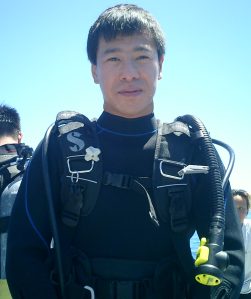SCUBA Diving

[Preparing to boat dive off Hateruma Island.]
|
I began learning to dive in 2003 in New Jersey at the Scuba
Connection (Hillsborough NJ), where I did my book and pool work
in preparation for the PADI Open Water (OW) license. I took private
one-on-one rather than group lessons because of my schedule.
Later on, I did my checkout dives at Dutch Springs PA, a
former quarry, wearing a 7mm two-piece neoprene wetsuit (14mm torso)
and thick hood and gloves with no feel. The water was cold, visibility
was poor and the struggle to put on all the gear and lumber down to
the water's edge was memorable. There were also virtually no
life-forms present in the water to distract one from the training
dives.
Fortunately, diving in warmer climes is significantly less of a
struggle and I have enjoyed diving in Mexico (San Carlos),
Fiji (Manaluca islands), Okinawa (Hateruma and Iriomote
islands) and Hawaii since then. I also have upgraded my
certification to the PADI Advanced Open Water (AOW) level.
|
Diving and Exercise
In theory, SCUBA diving is not a strenuous activity. Instead of
striving for maximum speed and workrate, one normally seeks to
minimize unnecessary motion, air consumption and heartrate. However,
prima facie observations can be deceiving.
In practice, I have found that there is a surprising effect on
athletic performance. In particular, the power I can put out on a
hillclimb, as measured by a SRM professional powermeter that is built
into the crank on my bicycle, drops significantly after a dive. I did
some informal experimentation with switching the order of diving
vs. bike training on alternate mornings and found a consistent and
measurable difference.
Equipment
Comfort and familiarity with equipment is very important for beginners
to intermediates like me. I rented for about a year before beginning
to accumulate (expensive) diving equipment. We're talking about
life-support equipment here, so it's probably worth buying solid and
proven gear for peace of mind as well as safety. If you're going to
skimp, just rent instead.
Another thing to bear in mind is that the international travel baggage
weight limit is generally set at 20 kg (44 lbs) unless one is
traveling from the US. Domestic weight limits have also dropped for
some airlines to 50 lbs; an important thing to bear in mind when
taking SCUBA gear along.
- Currently, I have a ScubaPro Knighthawk BCD (back aircell style),
shown here
and in the above picture. Size M and it weighs XX.
- I also use the Atomic Aquatics SS1 combination inflator/regulator,
shown here and in
the above picture, in place of the regular ScubaPro inflator and a
standard octo. This combination eliminates one hose.
- For the primary regulator, I have the Atomic Aquatics M1 model,
shown here, which
can be switched between Nitrox and air, should I ever want to get in
Nitrox for more bottom time. The top-end T1 model, made of titanium,
is much lighter but not cost-effective.
- As the picture above shows, I have only two hoses (one
high-pressure and one low-pressure) coming from the tank instead of
the usual four for wetsuit diving.
Using a Suunto Vytec dive computer, shown here
with the wireless air integration (AI) option eliminates the third
hose. I wear the computer on the wrist and it's easy to monitor my
tank pressure, remaining non-decompression time, projected remaining
air time (based on the last minute's air consumption), depth and dive
time without fiddling or fishing for equipment.
- Back in 2003, I began with lightweight Dacor Tiger fins, a
leaky-for-my-face mask and a bulky snorkel, all purchased at the time
I knew next to nothing about equipment. Now, I have more powerful
Apollo Bio-Fin Pro split-fins in grey, a better-fitting prescription
mask from GUL (no worries about contact lenses anymore) and the same
ScubaPro Phoenix snorkel, which is bulky and is on the schedule to be
replaced.
Streamlining through body position and the elimination of as many drag
items as possible is very important as any swimmer knows. You never
know when you have to swim against a current or need extra air-time to
get out of trouble.
- I have not picked up a wetsuit yet, which is the final item I
need. I do not plan to dive in cold water. I'm hoping to get the
Henderson Hyperstretch Aqua Suede when it comes out in late 2004. The
idea of a wetsuit that dries almost instantly is of great interest. A
soggy, cold wetsuit after your surface interval is not a pleasant
thing.
In the end, the payoff is better air consumption and intuitive levels
of familiarity, which makes for a better and more enjoyable dive experience.
Sandiway
